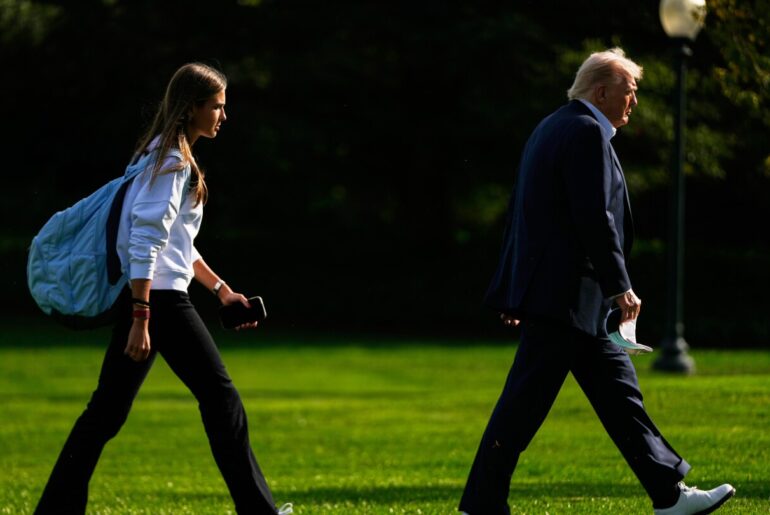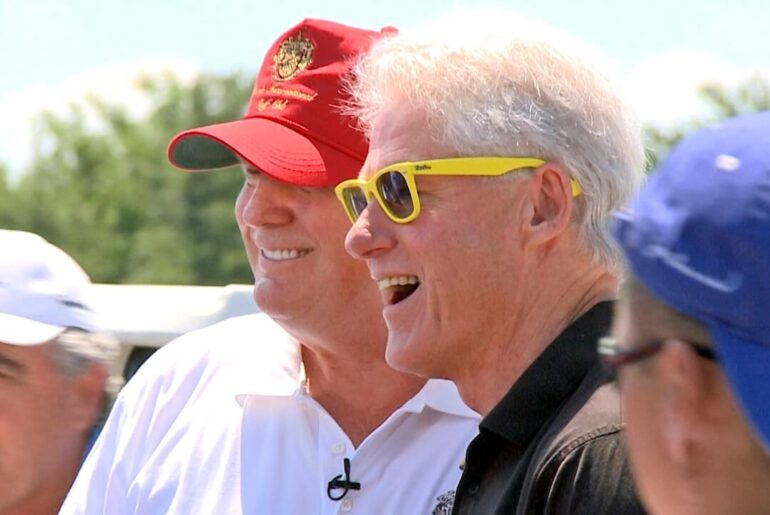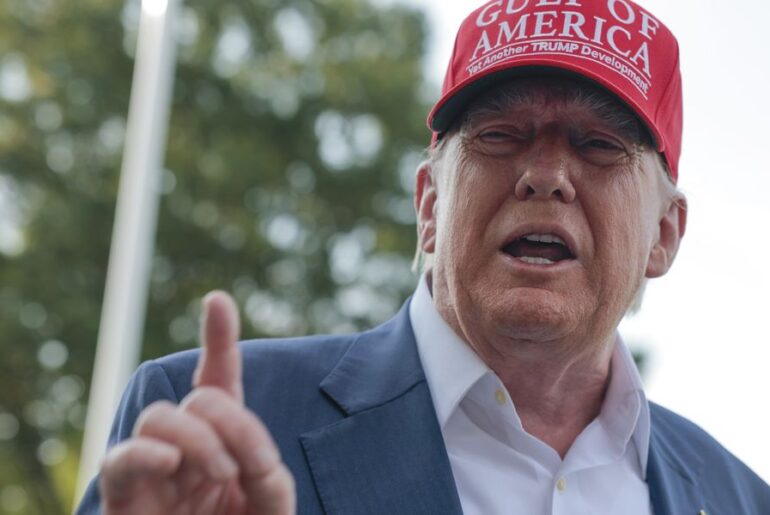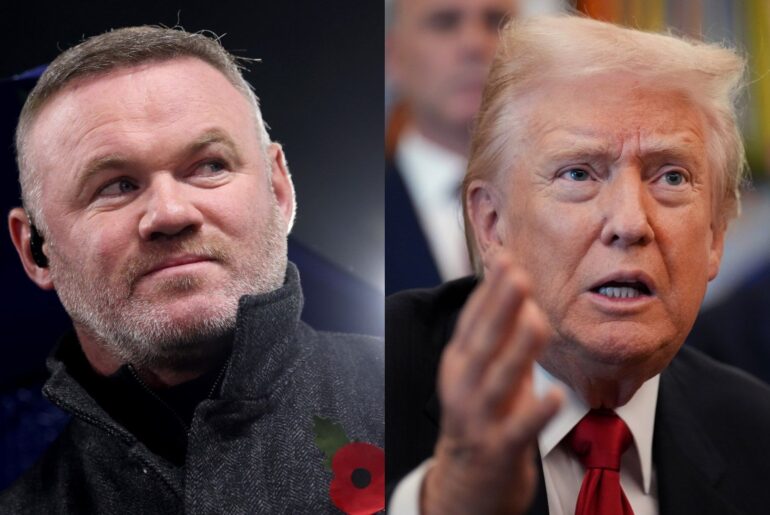Saudi Arabia’s crown prince, Mohammed bin Salman, is visiting the US this week for the first time in seven years – and Donald Trump is rolling out the red carpet for his favorite Arab autocrat. On Tuesday, Trump will host the prince for lunch and talks at the White House, followed by a black-tie dinner that includes members of Congress, business leaders and top administration officials. The next day, the Saudis will host US officials at an investment summit at the Kennedy Center.
It’s all part of a rehabilitation tour for Prince Mohammed, years after US intelligence agencies concluded that he had ordered the assassination of Jamal Khashoggi, a Washington Post columnist and Saudi dissident. In October 2018, Khashoggi was ambushed inside the Saudi consulate in Istanbul by a 15-member hit team, who dismembered his body with a bone saw. For a time, the killing turned Prince Mohammed into an international pariah. But Trump never wavered in his support of the Saudi leader, and during his first term protected the prince from US sanctions and pressure from Congress.
Prince Mohammed later repaid the favor to Trump: after a mob of the president’s supporters stormed the US Capitol in January 2021, several US banks and other businesses cut ties with the Trump Organization, which was already reeling from financial losses that hammered the tourism industry at the start of the coronavirus pandemic. But Saudi Arabia stood by Trump and his family business, expanding various real estate deals and golf partnerships that helped Trump at one of his lowest points. During his years out of power, the kingdom and its crown prince became one of the most important sources of new deals for the Trump brand, which had become toxic for many US businesses and consumers after the Capitol riot.
Trump has now rewarded Prince Mohammed with a victory tour of the US, along with new American security guarantees for the kingdom and a planned sale of billions of dollars in advanced US fighter jets. But Trump was also eager to repay the prince’s loyalty with an extravagant welcome that is usually reserved for the closest US allies. “I just want to thank you,” Trump told the prince at the White House on Tuesday in front of reporters and cabinet members. “We’ve been really good friends for a long period of time. We’ve always been on the same side of every issue.”
Aside from heaping praise on his friend, Trump also fiercely defended the prince when a reporter asked about Khashoggi’s murder. “Things happen,” Trump said of the assassination and then insisted that Prince Mohammed “knew nothing about it” – despite US intelligence agencies concluding otherwise during Trump’s first term.
The president’s treatment of Prince Mohammed underscores his corrupt and transactional approach to governing, and the ways that wealthy autocrats have learned to exploit Trump by supporting his extensive business interests. The prince and his advisers know that Trump views the world in terms of deals won or lost – and they’re eager to cultivate a closer relationship with the president by boosting his family business, along with deals to buy US weapons and make investments. Days after Trump began his second term in January, the prince pledged he would invest $600bn in the US economy over the next four years. On Tuesday, he promised to increase that pledge to $1tn, although the details of exactly how Saudi investments would reach that level remain hazy.
For Prince Mohammed, the primary goal of his visit, aside from being lavished with Trump’s praise, was to secure a defense cooperation agreement between the US and Saudi Arabia. That deal falls short of the formal defense treaty that the kingdom has sought for years, but such a treaty would require approval from Congress. For now, Trump offered an agreement to extend US defense guarantees, boost weapons sales and increase intelligence sharing. (In September, Trump signed a similar executive order focused on Qatar, which promised the US would come to the emirate’s defense if it is attacked.)
The prince also signed a deal for Saudi Arabia to buy dozens of F-35 stealth fighter jets, America’s most advanced warplane. Pentagon officials are worried that, if the sale goes through in the coming years, China might be able to acquire the plane’s technology through espionage or its security partnership with the kingdom. For his part, Trump tried to persuade the Saudi leader to establish diplomatic relations with Israel now that the US administration has brokered a tenuous ceasefire in Gaza. Trump dreams of securing a Nobel peace prize by negotiating an agreement between Israel and Saudi Arabia, but the prince has vowed not to sign a deal with Israel until it commits to the establishment of a Palestinian state.
Even if Prince Mohammed did not relent on a normalization deal with Israel, he has amassed more goodwill with Trump than most other world leaders. And much of that benevolence is rooted in Saudi Arabia’s support for Trump’s golf resorts and other businesses when he was out of office. After the January 6 attack on the Capitol, the PGA of America cancelled its 2022 major championship at the Trump National Golf Club in Bedminster, New Jersey. “It’s become clear that conducting the PGA championship at Trump Bedminster would be detrimental to the PGA of America brand,” the group’s president said at the time.
But Trump soon convinced a rival group, the LIV Golf league, which is financed by the Saudi sovereign wealth fund that is controlled by the crown prince, to host its tournaments at his golf courses. The tournaments brought Trump’s properties back into the professional golfing circuit after the Trump Organization had lost the PGA championship, one of golf’s four major competitions. The LIV Golf tournaments, which have been held at Trump courses in Bedminster, Miami and Washington, provided millions of dollars in revenue for the Trump family business.
And the Saudi-backed league is still paying to use Trump’s properties for its tournaments, even after his reelection. In April, Trump’s golf club outside Miami hosted a three-day tournament for the LIV Golf circuit, an event that was almost entirely funded by Saudi Arabia’s sovereign wealth fund. LIV Golf paid the Trump Organization a site rental fee of around seven figures, which doesn’t include revenue generated by hotel room rentals, restaurants and other services. In 2023, Trump called the income his businesses receive from deals like those with LIV Golf “peanuts”. But governance watchdog groups say the Saudi-backed league’s payments to Trump’s golf courses violate the constitution’s foreign emoluments clause, which prohibits the president from receiving gifts from foreign powers.
In Trump’s first term, his son-in-law and senior adviser, Jared Kushner, cultivated a close relationship between the president and Prince Mohammed, who at the time was consolidating power as the kingdom’s de-facto ruler under his ailing father, King Salman bin Abdulaziz Al Saud. After Khashoggi’s assassination in 2018, the prince became more dependent on Trump and Kushner, who worked to protect him from fallout over the journalist’s murder.
As members of Congress demanded sanctions against the crown prince, Trump maintained his support for the Saudi leader and pressed for continued weapons sales and business deals with the kingdom. Prince Mohammed eventually blamed rogue Saudi operatives for the gruesome killing. But a US intelligence report, which Trump refused to make public, concluded that the crown prince had ordered the assassination. The report, which was released by Joe Biden’s administration a month after it took office, noted that since 2017, Prince Mohammed “has had absolute control of the kingdom’s security and intelligence organizations, making it highly unlikely that Saudi officials would have carried out an operation of this nature without the crown prince’s authorization”.
Days after Khashoggi’s killing, Trump was asked by reporters in the Oval Office whether he would cancel billions of dollars in US weapons sales to Saudi Arabia if its leaders were implicated. “We don’t like it even a little bit,” Trump responded. “But whether or not we should stop $110bn from being spent in this country… That would not be acceptable to me.”
At the time, Trump’s comments about the loss of arms sales struck many as a crass attempt to justify Khashoggi’s assassination. But Trump had dropped any pretense of concern for human rights and political freedoms, which past US presidents used to obscure decades of American military support for repressive regimes like Saudi Arabia. Trump stripped the US-Saudi alliance down to its transactional core: Washington protects the House of Saud in exchange for the Saudi regime keeping global oil prices stable and buying a steady supply of US weapons.
With little restraint on his powers, Trump has expanded that corrupt and transactional method of governing in his second term. And autocrats like Prince Mohammed are eager to benefit from Trump’s brazen effort to use the presidency to enrich himself and his family.
Mohamad Bazzi is director of the Center for Near Eastern Studies, and a journalism professor, at New York University







